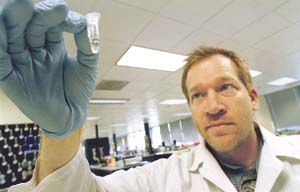
Friday, 12 April 2002
http://www.azstarnet.com/star/today/20412DNA.html

East Valley Tribune
Expanded DNA testing would help state criminologists like Dan Merena track criminals and enhance the ability of police to solve crimes.
By Howard Fischer
CAPITOL MEDIA SERVICES
PHOENIX - Just days after a convicted murder was freed by DNA evidence, Arizona is moving to dramatically expand the use of the genetic material in police investigations.
Under a plan approved by the House Justice Committee Thursday, the state would begin testing everyone convicted of a felony - about 40,000 people a year. It also would test the approximately 57,000 people now behind bars or on probation for felony convictions.
The move would expand the DNA database of criminals by 900 percent, greatly enhancing the ability of police to solve crimes - or free people who are wrongly convicted. Currently, the state tests only murderers, sex offenders, some burglars and those convicted of weapons violations.
"This is the 21st century fingerprint," said Rep. Bill Brotherton, D-Phoenix. He said the legislation will go a long way toward ensuring that the people who are convicted and incarcerated - as well as executed - are the ones who are guilty.
Maricopa County Superior Court Judge Ronald Reinstein cited the case of Ray Krone in touting the need for the new law. Krone, who had spent 10 years in jail after being convicted of murdering a bartender, was released from jail Monday after Maricopa County Attorney Richard Romley concluded that DNA samples at the scene of the crime pointed to another suspect.
"If Arizona had the legislation that's being proposed now 10 years ago and if it had been funded, the Phoenix Police Department crime labs could have sent the crime scene DNA profile through the national database and come up with a cold hit right then to identify the true suspect in the case - which, of course, would not have been Ray Krone," the judge said.
Reinstein told lawmakers that DNA testing is essential to maintaining public confidence in the police and the courts.
Cindi Nannetti, who heads the sex crimes unit of the Maricopa County Attorney's Office, told lawmakers during a committee hearing Thursday that far more "cold cases" could be resolved by expanding the DNA database.
Authorities believe it is possible to solve more crimes by taking DNA from inmates because they are likely to be repeat offenders or have committed crimes for which they have not been caught.
Reinstein said the experience of Virginia shows how putting the DNA of all felons into a database helps solve crimes.
He said in 2000 that state had "cold hits" on DNA from 153 crime scenes. These are cases where there is no known suspect but a match is made from the database.
By last year Virginia had more than 300 cold hits. And this year, the judge said, the state is well on its way to matching 500 unsolved crimes with felons.
Although the legislation gained unanimous committee approval, Rep. Gary Pierce, R-Mesa, expressed some reservations. Pierce said he feared that police and prosecutors might put too much reliance on DNA evidence.
Nothing in the legislation requires the state to start running new tests on DNA from already solved crimes to see if someone behind bars actually is innocent.
That possibility is covered by a separate state law approved two years ago that allows inmates to request DNA testing of any evidence that still exists from the time of their arrest and conviction. A judge is required to order the tests if there is a reasonable chance the testing would have resulted in the person's being acquitted or not having been prosecuted at all.
This new legislation, which has been approved by the Senate, now goes to the full House.
Back to Story
--------------------------------------------------------------------------------
All content copyright © 1999, 2000, 2001 AzStarNet, Arizona Daily Star and its wire services and suppliers and may not be republished without permission. All rights reserved. Any copying, redistribution, or retransmission of any of the contents of this service without the expressed written consent of Arizona Daily Star or AzStarNet is prohibited.